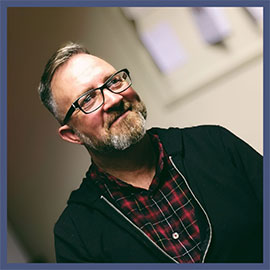
Spotlight on... Tadgh Crozier
February is LGBT History Month UK and this month we shine our spotlight on Tadgh Crozier who is studying the BA Health and Social Care 
Where are you from?
Originally I am from Croydon but now I live in Carmel, Gwynedd. I love living in north Wales, it’s a beautiful place and I can’t think of anywhere else I’d like to be right now. I am also learning Welsh so ‘helo pawb’.
What aspects of the BA Health and Social Care programme are you enjoying the most?
I enjoy the lectures as I am learning something new all the time but I like to debate and discuss, so I really enjoy the seminars.
Why did you choose the School of Health Sciences in Bangor?
I’ve been working in the social care field for several years. This has been within substance misuse, sexual health, HIV support and prison services. The Health and Social degree covers all of these areas and has allowed me to gain further insight and knowledge, which is great as one of my aims is to be able to make policy changes within the third sector.
What areas of health are you interested in?
I am interested in sexual health and HIV support and I would like to focus more on making services more accessible for the LGBT community living in rural areas. I'm interested in supporting individuals who are addicted to chemsex.
What is chemsex?
Chemsex is the use of three drugs (Crystal methamphetamine, mephedrone and GHB/GBL) which are used in a sexual context, specifically by gay men.
What is the appeal of chemsex?
Using these drugs can make you feel extremely sexually aroused, increase your confidence and keep you awake for days. Many gay men experience discrimination and so drugs can often be used as an escape from painful or difficult experiences, and to allow individuals to connect with others more intimately and experience a greater sense of belonging. There is still so much shame and stigma around being gay. Connection is something that comes up time and time again; chemsex is far more complex than just having a lot of uninhibited sex.
What are the risks?
An increase in sexual partners and loss of inhibitions resulting in an absence of safe sex precautions could result in an increase in sexual transmitted infections and HIV. What we are also seeing is that chemsex can also impact on someone’s mental health, not only due to the drug use, but also the effects of staying awake for days can take its toll. Feelings of shame, guilt and hopelessness can also be experienced once the effects have worn off. People are more vulnerable under the influence of drugs and may lack the ability to make rational decisions. Drug use can also impact on relationships and within the workplace.
Tell us a bit more about the chemsex project you are involved in.
I am currently involved with a group who are looking to set up a charity for men who have sex with men who have been using chems, and are looking to re-connect with others in a positive way. The journey to leaving that environment can often result in the loss of human contact and connection and sense of belonging. The project will aim to encourage meaningful friendships, social connections and reintegration into positive social acitivities. It’s at the early stages right now but the need is there, across the UK.
Do health services need to understand more about this here in north Wales?
Moving to north Wales I realise how accessible LGBT services were when I lived in London. I believe it is important to raise awareness around the issues that LGBT people face. I do not think it is enough to just ‘treat everyone the same’ as we all have different needs and the needs of LGBT individuals will again often be different. The drugs used within chemsex are accessible all across the UK, not just major cities, so having an understanding about the issues in more rural areas is still very important, even if it’s to help just one individual.
What do you do to relax?
I like reading, a couple of my favourites are ‘’Power of now ‘’ and ‘’Velvet Rage’’. I also love swimming or Hot Yoga.
What are your plans after finishing the course?
I’d like to carry on studying and maybe become a lecturer at Bangor University. I would also like to establish an LGBT network or foundation within Wales. I am passionate about improving the wellbeing of LGBT individuals and I know I will achieve this in some capacity.
If you are interested in the BA Health and Social Care programme at Bangor, you can contact Dr Julianne Law for further information: j.law@bangor.ac.uk
If you’re looking for information about Sexual Health, the following link gives you an outline of the services Betsi Cadwaladr University Health Board provides across North Wales:
http://www.wales.nhs.uk/sitesplus/861/page/51457
